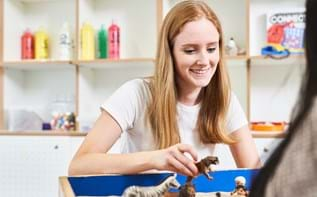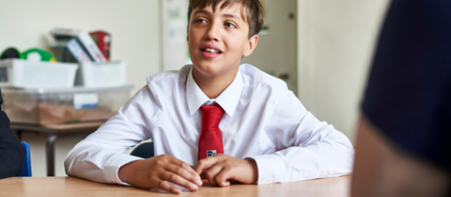What is a whole-school approach?
A whole-school approach involves all parts of your school working together to prioritise mental health and wellbeing in the school community. It requires an active partnership between your pupils, your school staff, parents and carers and members of the wider school community. A whole-school approach is central to the mental health services we provide in our partner schools.
What are the principles of a whole-school approach?
There are eight principles of a whole-school approach to mental health, as set out by:
- Public Health England and the Department for Education in England
- the Welsh Government in Wales
- the Scottish Government in Scotland.
As a Place2Be partner school with our in-school mental health services, we'll help you implement these principles to achieve a whole-school approach to mental health that benefits every member of your school community.
1. Leadership and management
Leadership and management that supports and champions efforts to promote emotional health and wellbeing.
Your school leadership team are essential to a successful whole-school approach. Senior leadership teams, including your school governors, must champion efforts to promote mental health and wellbeing across your school community.
As a partner school that benefits from our in-school mental health services, we will encourage you to identify a Senior Mental Health Lead (SMHL). Your SMHL will lead the implementation of a whole-school approach.
All Place2Be partner schools in England and Scotland can access our Senior Mental Health Leads training programme. The programme supports senior leaders in:
- identifying what your school community needs to improve the mental health and wellbeing of its members
- developing ways to meet those needs
- building leadership skills with positive mental health
- growing your school's supportive networks
- sharing best practices with peers from other schools.
2. Teaching and learning
Curriculum teaching and learning to promote resilience and support social and emotional learning.
What is social and emotional learning?
Social and emotional learning (SEL) aims to help pupils improve their:
- decision-making skills
- communication
- emotional understanding
- self-esteem.
SEL has the potential to benefit pupil health and wellbeing. As a Place2Be partner school, we will support your pupils' social and emotional learning by sharing expertly-developed whole-class work, resources and activities. These resources cover topics such as building self-esteem and developing healthy ways to cope.
Our Art Room team are specialists in using art to support and enhance children and young people’s wellbeing.
Discover some of the resources we have made available for all schools on our Mental health resources for schools page.
3. Pupil voice
Enabling pupil voice to influence decisions.
By involving pupils in decision-making, your school can create meaningful change and implement better support systems that allow your pupils to develop emotionally and achieve academically.
Enabling pupil voice can also benefit the mental health of children and young people by:
- making them feel part of their school community
- helping them believe in themselves
- developing their independence
- building their decision-making skills.
Schools with a strong commitment to pupil voice have reported many positive benefits and outcomes. These include a decline in exclusions, better behaviour, and improved attainment and attendance.
Find out how one of our partner schools champions pupil voice in their school community
4. Staff development
Staff development to support their own wellbeing and that of their students.
Promoting the health and wellbeing of your school staff is key when implementing a whole-school approach. As well as looking after their own mental health, it's important that your school staff can access training that increases their knowledge of mental health and wellbeing.
Growing your school staff's understanding of mental health can help them in:
- identifying mental health difficulties in their school community
- knowing the appropriate actions to take if they are concerned about one of their pupils.
Staff development is a core part of the mental health services we provide in our partner schools. We offer a variety of training and development opportunities related to mental health and wellbeing to our partner schools, including specialist training for senior leaders.
Learn more about mental health services we provide for staff as part of our partner school services
5. Working with parents, families and carers
Children and young people spend only 15% of their time in school, with 85% spent at home or in communities. This makes working with parents and carers key in influencing children and young people's mental health and wellbeing and core to a whole-school approach.
We provide lots of universal and targeted support to parents and carers as part of our partner school services, including individual parenting training and an exclusive parenting course.
Learn more about the services we provide parents and carers in our partner schools
6. Targeted services
Targeted services and appropriate referral
Certain factors put children and young people at a greater risk of poor mental health, including:
- poverty
- abuse
- witnessing domestic conflict or violence1.
If vulnerable children are not provided with the emotional and mental health support they need, it can affect them well into adulthood. A whole-school approach focuses on intervening early regarding and, when appropriate, referring to other agencies, such as Child and Adolescent Mental Health Services (CAMHS).
As part of our in-school mental health service, we encourage and educate school staff to identify issues in their pupils early so we can provide them with appropriate support as soon as possible. Struggling pupils are provided with one-to-one counselling following an individual mental health assessment and referred to external agencies if they need help beyond in-school targeted interventions.
Find out more about the mental health services we provide pupils in our partner schools
7. Ethos and environment
An ethos and environment that promotes respect and values diversity
Pupils and school staff are in the school environment every weekday. We know that the state of that environment can affect:
- physical health
- mental health
- emotional wellbeing
- attainment
- behaviour3.
With such a wide-reaching impact, it's vital to a whole-school approach that your school community is a safe and supportive place where your pupils can enjoy their learning.
As a Place2Be partner school, we will help you create a school culture that champions acceptance and respect and combats bullying, harassment, and abuse to support a whole-school approach.
8. Identifying need and monitoring impact
Using tools to discover need and measure impact
Understanding what pupils need from your school to support their mental health and wellbeing can help to:
- plan what changes your school should make
- measure the impact of these changes.
Children like to express their feelings in different ways. Using the right tools would inform your school of the support they could offer to pupils. For example, pupils could do creative activities or complete questionnaires (e.g. the Stirling children’s wellbeing scale or the Strengths and Difficulties Questionnaire).
Using the outcomes of these activities, you can help your school make changes to support your pupils’ mental health and wellbeing. As a Place2Be partner school, you can access the variety of services we offer to both pupils and school staff.
Measuring our impact is important. We collect information from schools about our work and we use this information to assess our effectiveness in improving our services.
Find out more about the impact of Place2Be services in schools across the UK







